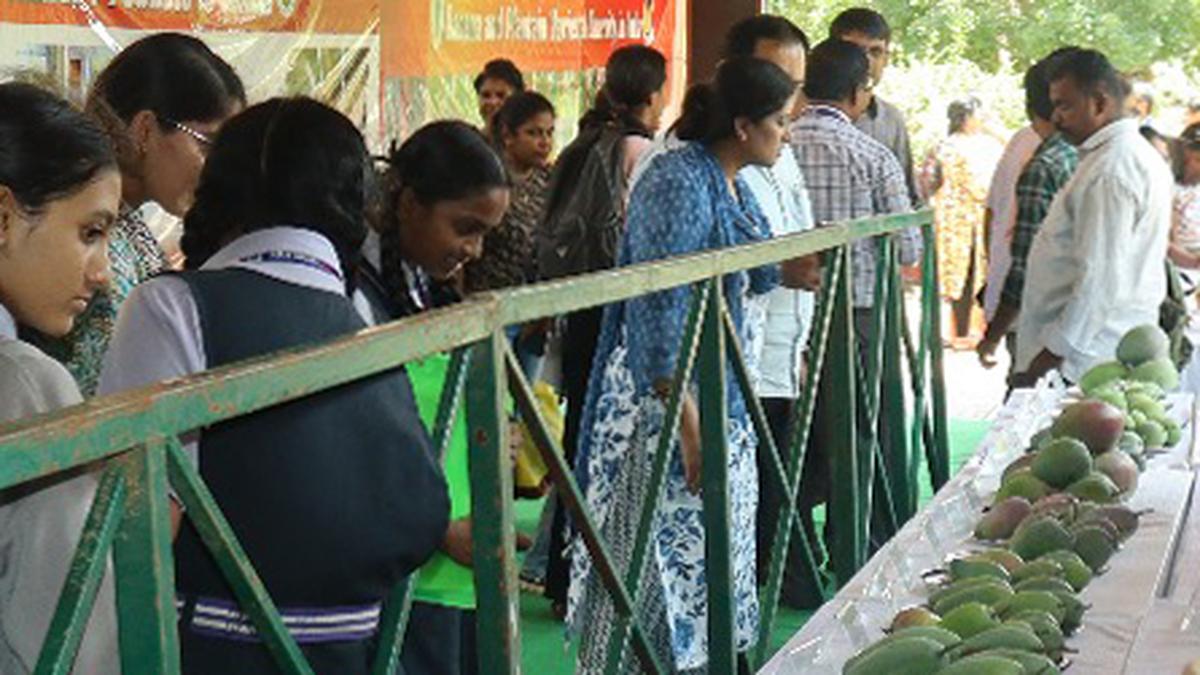
Triphal Diversity Show at IIHR attracts many visitors, farmers
The Hindu
A crowd comprising farmers, researchers, professors, students, and horticulture enthusiasts thronged the ICAR-Indian Institute of Horticultural Research (IIHR), Hesaraghatta, Bengaluru, on Friday for the inaugural ceremony of the Triphal Diversity Show which showcased 300 mango, 100 jackfruit, and 100 banana genotypes in collaboration with ICAR-National Research Centre for Banana, Tiruchirappalli.
A crowd comprising farmers, researchers, professors, students, and horticulture enthusiasts thronged the ICAR-Indian Institute of Horticultural Research (IIHR), Hesaraghatta, Bengaluru, on Friday for the inaugural ceremony of the Triphal Diversity Show which showcased 300 mango, 100 jackfruit, and 100 banana genotypes in collaboration with ICAR-National Research Centre for Banana, Tiruchirappalli.
Sanjay Kumar Singh, head of the Division of Fruits and Horticultural Technology, ICAR, threw light on the national and global implications of mango, jackfruit, and banana cultivation for the livelihoods of farmers who hail from different socio-economical backgrounds. He beckoned literate youth to cultivate interest in India’s “aggressive market” that has great potential in South and Central Asia. He highlighted the importance of fresh fruits that hold a distinct place in India’s social fabric and the necessity of exports and processing on the global market.
At the stalls set up at the three-day show, experts provided detailed explanations to visitors on the genetic variations that embedded the form and utility of the mangoes, bananas, and jackfruit. A jackfruit weighing 40 kg, called the Mahapathari, and mangoes derived from the agricultural phenomena of polyembryonic seeds (the formation of more than one plant from a single seed) garnered curiosity and interest.
There were four mango stalls, mainly selling Dharwad alphonsos, and a jackfruit stall. “We will increase our jackfruit stock based on demand,” said an official from the IIHR as people were keen to grab jackfruit varieties at a low price.
Two memorandums of understanding (MoU) were exchanged between the IIHR and the Australian consulate alongside the releases of two publications Livelihood for the Unreached and Marginalised and Souvenirs, during the inaugural event. Seven farmers were awarded with the honour of “custodian farmers” for their efforts in conserving mango, jackfruit, and banana genotypes.

“Writing, in general, is a very solitary process,” says Yauvanika Chopra, Associate Director at The New India Foundation (NIF), which, earlier this year, announced the 12th edition of its NIF Book Fellowships for research and scholarship about Indian history after Independence. While authors, in general, are built for it, it can still get very lonely, says Chopra, pointing out that the fellowship’s community support is as valuable as the monetary benefits it offers. “There is a solid community of NIF fellows, trustees, language experts, jury members, all of whom are incredibly competent,” she says. “They really help make authors feel supported from manuscript to publication, so you never feel like you’re struggling through isolation.”

Several principals of government and private schools in Delhi on Tuesday said the Directorate of Education (DoE) circular from a day earlier, directing schools to conduct classes in ‘hybrid’ mode, had caused confusion regarding day-to-day operations as they did not know how many students would return to school from Wednesday and how would teachers instruct in two modes — online and in person — at once. The DoE circular on Monday had also stated that the option to “exercise online mode of education, wherever available, shall vest with the students and their guardians”. Several schoolteachers also expressed confusion regarding the DoE order. A government schoolteacher said he was unsure of how to cope with the resumption of physical classes, given that the order directing government offices to ensure that 50% of the employees work from home is still in place. On Monday, the Commission for Air Quality Management in the National Capital Region and Adjoining Areas (CAQM) had, on the orders of the Supreme Court, directed schools in Delhi-NCR to shift classes to the hybrid mode, following which the DoE had issued the circular. The court had urged the Centre’s pollution watchdog to consider restarting physical classes due to many students missing out on the mid-day meals and lacking the necessary means to attend classes online. The CAQM had, on November 20, asked schools in Delhi-NCR to shift to the online mode of teaching.









